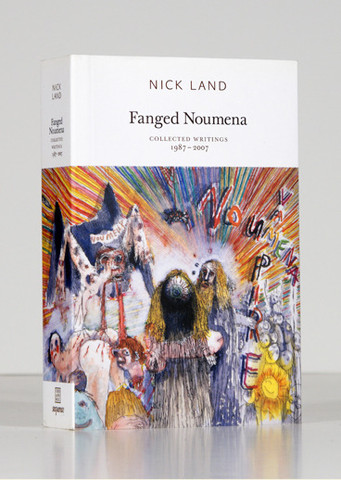Impossible Mike
http://topologyoftheimpossible.com
refuse reality, live forever.
http://topologyoftheimpossible.com
refuse reality, live forever.
“Poetry is nothing but a certain astonishment before the world and the means for this astonishment.”
Andre du Bouchet, 1954
Reality meant that I could neither afford nor have time to read every book that came out this year that I wanted to read, but out of what I did read (which was, coincidentally, a lot more books than I normally read that are released/realized in the year I currently exist in), the following were my favorites.

FANGED NOUMENA by NICK LAND
The first book on this list I haven’t even finished reading, an immense 560 page tome collecting virtually all of Nick Land’s writings from 1987-2007–excepting only the full-length text The Thirst for Annihilation: Georges Bataille and Virulent Nihilism–is a massively important text, because Nick Land is, in my opinion, one of the most important thinkers of our present. Land takes apart the world and rebuilds it, offering particularly apt readings of Kant, Nietzsche, Bataille, Heidegger, and more that really flows new light into the dusty thoughts of many often-over-valued thinkers (can a known philosopher be over-valued? maybe not, but often the most known/taught readings of said thinkers certainly can be). Land pioneered the idea of the theory-fiction, using fiction as a tool to explore critical theory, a technique now practice by many affiliated with the book’s press, Urbanomic. This book is a map towards the next level, and as the jacket copy proposes: “Can what is playing you make it to Level 2?”
Buy from Urbanomic (in the UK) or Sequence Press (in the US)

THERE’S NEVER BEEN A DAY THAT DIDN’T REQUIRE KNIVES LIKE THESE by JEFF GRIFFIN
Jeff Griffin is a poet who is, sometimes, from Iowa, who writes some of the most amazing contemporary poetry I’ve encountered. THERE’S NEVER BEEN A DAY… is, as the Human500 website describes, “A book composed of transcriptions of found papers from the desert and original poems by Jeff Griffin.” It’s a hazy mess of desperation and excitement, the desert being a place of secrets, magic, and despair. I read this hung-over in a train-station after I missed my train and had two hours to kill, and upon finishing it I relished my hang-over, smiled to myself, shut my eyes, and blissed out until it was finally time for me to board my train.
Out of print from Human 500

[Matchup #30 in Tournament of Bookshit]
I’ve never read the Georgia Review. I have eaten dinner at Chili’s probably 50 times throughout my life. My favorite dish to get at Chili’s, the dish that has remained my favorite transitioning through all of the various eating habits I’ve had (being no-restriction to vegetarian to pesceterian to vegan), is the fajitas. The fajitas at Chili’s are exciting because they are a spectacle. Looking at the website for the Georgia Review, I see a complete lack of spectacle. Chili’s was my favorite restaurant growing up because it took me a while to develop any sort of palate for foods that are not ultimately mediocre. While it would seem that both the Georgia Review and Chili’s are ostensibly mediocre, Chili’s maintains a specific midwestern magic. Chili’s is, I guess, supposed to be “Tex-Mex” food, though that term really has no meaning whatsoever. READ MORE >
Since it’s the terrible day of capital-death known as BLACK FRIDAY, I’ve decided that a more positive gesture, to assuage all the guilt of those who are pimp their souls to save a buck (we’ve all been there in some regard), is needed. Thus, I’d like to publish a brilliant work of literature that specifically makes use of the medium it’s being published on; namely THE INTERNET. Russ’s work takes a note from old text-based RPGs (MUDs to be more specific) on telnet, an entirely antiquated form that, as Russ’s work proves, is ripe for exploration.
Russ Woods lives in Chicago and edits Red Lightbulbs with his wife Meghan Lamb.
Click “more” to read Russ Woods’s brilliant Unrepairable.
READ MORE >
In Spheres III, I attempt to explain why we should not only purge the two portentous words revolution and mass from our vocabulary, but also the concept of “society.” It suggests a coherence that could only be achieved by violent asserting conformism. The conglomerate of humans that has, since the 18th century, called itself “society” is precisely not based on the atomic dots that we tend to call individuals. Instead, it is a patchwork of milieus that are structured as subcultures. Just think of the world of horse lovers—a huge subculture in which you could lose yourself for the duration of your life but which is as good as invisible if you are not a member of it. There are hundreds if not thousands of milieus in the current social terrain that all have the tendency from their own viewpoint to form the center of the world and yet are as good as nonexistent for the others. I term them inter-ignorant systems. And, among other things, they exist by virtue of a blindness rule. They may not know of one another, since otherwise their members would be robbed of the enjoyment of being specialized members of a select few. In terms of their profession, there are only two or three types of humans who can afford polyvalence in dealing with milieus. The first are architects who (at least virtually) build containers for all; the second are the novelists, who insert persons from all walks of life into their novels; finally come the priests who speak at the burials of all possible classes of the dead. But that is probably the entire list. Although, no, I forgot the new sociologists à la Latour.
In other words, the multiple personality on the one hand and the single networker on the other— those are the two options I see open to individualized populations. The way homo sapiens is influenced by the dowry from the days of hording is no doubt insurmountable, but because the explication of that old heritage continues simultaneously in various directions, the proto-social elements of the life of sapiens can be reworked. They lead to an electronic tribalism. In the dyadic motifs, by contrast, the intimate relationships are explicated to such a degree that intimacy can quite literally be played through with the technical media of self-supplementation. In the long run, human types arise that are fairly unlike what we have known to date.
(hat tip to “kashi butterfield”)
“Kafka Writes to Romeo / Romeo Writes Back,” by Catherine Gammon; video by Meghan Lamb
Artifice Magazine is releasing its fourth issue in Chicago this weekend
There will be readings and short films and disembodied voices
If you are in or nearby Chicago we would love to see you there
Here are the details:
Elegant Mr. Gallery
1355 N Milwaukee Ave, Chicago
November 12
8 to midnight
Here is where you can find our fourth issue, otherwise